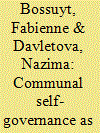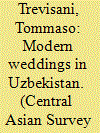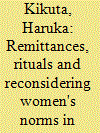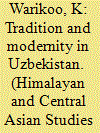| Srl | Item |
| 1 |
ID:
127439


|
|
|
| 2 |
ID:
190181


|
|
|
|
|
| Summary/Abstract |
In the European Union’s (EU) new Strategy for Central Asia, which was launched in May 2019, boosting the resilience of Central Asian societies is singled out as a key priority. Drawing on post-development thinking, this article argues that if the EU is serious about promoting resilience to empower ‘the local’ and contribute towards a truly sustainable future for the societies of Central Asian countries, then the EU will need to embrace a de-centred, post-neoliberal approach to resilience. This implies that the EU would have to accept ‘the other’ – in this case, the Central Asian societies – for what they are and advocate home-grown self-organization based on a deep understanding of the local meaning of good life and local knowledge about the available resources. Empirical illustrations to substantiate this claim are drawn from a concrete case, namely the mahalla in Uzbekistan.
|
|
|
|
|
|
|
|
|
|
|
|
|
|
|
|
| 3 |
ID:
186632


|
|
|
|
|
| Summary/Abstract |
Despite the extensive literature on the nexus between civil society and democratization in non-democratic regimes, most existing scholarship focuses on politically oriented and claim-making civil society organizations. While these accounts provide useful insights, they appear to rely on Western-centric understandings of civil society. Undoubtedly, little space exists in non-democratic regimes within which civil society organizations may engage in overt political activism due to governmental restrictions. Notwithstanding these restrictions, there are politically less threatening social arenas, where it is possible to identify informally organized civil society initiatives with the potential to redefine and influence long-term state–society relations. This article argues that what we might think of as civil society initiatives in non-democratic regimes cannot be satisfactorily understood through the lens of Western-centric understandings of civil society. Instead, we should focus on informal civil society initiatives. These processes will be illustrated through the case study of mahalla institutions in Uzbekistan.
|
|
|
|
|
|
|
|
|
|
|
|
|
|
|
|
| 4 |
ID:
144162


|
|
|
|
|
| Summary/Abstract |
Under the new conditions of independence, wedding ceremonies in Uzbekistan have increasingly diversified along growing social and economic divides. Recent state measures to curb ritual expenditures follow the furrow of a long tradition of criticism against ritual prodigality which, however, falls short of its self-set target of enforcing more ‘rational’ rituals. Based on fieldwork conducted in the Ferghana Valley, this paper sheds a new light on the controversy around ‘excessive ritual expenditures’ by discussing tensions in local practices arising from changing livelihoods and consumption patterns, on the one hand, and, on the other, from an ambivalent state policy that aims at containing ritual expenditures and social polarization, while also promoting an ideal of modern wedding that undermines the very aim of the policy.
|
|
|
|
|
|
|
|
|
|
|
|
|
|
|
|
| 5 |
ID:
144164


|
|
|
|
|
| Summary/Abstract |
This paper describes recent economic and social changes in Central Asian neighbourhood communities known as mahallas, using data from a town in Ferghana Valley. First, it examines how the increasing costs of life-cycle rituals are damaging the harmony of mahallas. Since 2007, more and more hosts have begun to outsource the provision of food and services for these rituals, using money acquired mostly through emigrant labour. This in turn lessens mahallas’ mutual aid practices, and reveals emerging economic disparities between neighbours. Secondly, the paper argues that emigration has had transformative effects on the lifestyles of Muslim women in mahallas. With the globalization of their economy, conventional local norms are becoming harder to obey, and some young and middle-aged women are choosing to live outside these norms. Dependence on emigrant labour and the associated remittances has significantly affected the lifestyles and morals of mahalla inhabitants.
|
|
|
|
|
|
|
|
|
|
|
|
|
|
|
|
| 6 |
ID:
127438


|
|
|